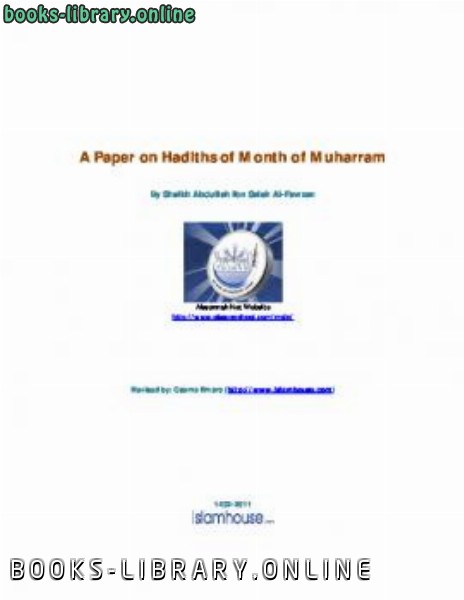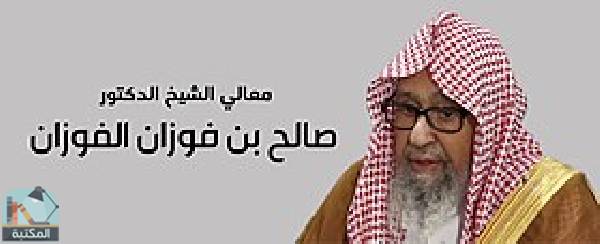📘 قراءة كتاب A Paper on Hadiths of Month of Muharram أونلاين


Allah Almighty says: “Surely in the creation of the heavens and the earth and in the
alternation of the night and the daytime there are signs indeed for ones endowed with
intellects.” [2/190], “Surely, in the alteration of the night and the daytime and whatever
Allah has created in the heavens and the earth, are indeed miracles for a people who are
pious.” [10/6], and “Allah turns about the night and the day-time. Surely in that is indeed a
lesson for the ones endowed with beholdings.” [24/44].
***
In the above cited verses Allah Almighty tells us about universal cynosures serving to
demonstrate His omniscience, omni-competence and omni-mercy as manifested in the
alteration of night and day and constant mutual succession thereof as well as their varying
length and hotness, coldness and mildness; all of which involve great benefits for all living
creatures. These are but part of divine mercy and favors bestowed on living creatures
though recognized only by the sagacious and insightful who realize the divine reason behind
creating night, daytime, the sun and the moon, and discern the sapience of day, year
daytime and night succession.
Allah has made night and daytime collecting spans of time for works and mortalities for they
both keep rotating to motivate the righteous to perform good and righteous deeds. So,
whoever misses a tradition of good at night, they can make up for it at daytime and vice
versa as Allah says, “And He is the One Who has made the night and day-time a succession
for whomever is willing to constantly remember or whomever is willing to five constant
thanks.” [25 / 62]
Such succession should be attended to by believers for it causes new objects to be
timeworn, far dates to draw nearer, lives to grow shorter, young people to grow older and
the elderly to pass away. Undoubtedly, every passing day draws people further from this
world and nearer to the Hereafter.
Surely, a blessed person is the one who holds himself accountable, considers their past and
uses time for the benefit of their faith and worldly purposes alike. Oppositely, a disregardful
person wastes time, holds deplorable past and will definitely meet a regrettable end. Hence,
we seek refuge by Allah against negligence and procrastination.
While we are about to irrevocably depart a full observing year, we are also about to receive
another new one; a fact triggering self-accountability to set right shortcomings and repent
thereof in case of negligence, and to stop any forms of self-oppression manifested in
disobedience to Allah and the Messenger before death. Yet, an upright person, grace be to
Allah, should in turn offer thanks to Allah and ask Him steadfastness thereto forever.
Such self-accountability is not restricted to these days. It is rather required at all times since
a constant self-accounting person would lead an upright life of righteous deeds. Otherwise,
a person would lead a mean life of vicious deeds.
A Paper on Hadiths of Month of Muharram Islamhouse.com
A regrettable fact of today's world is that many persons would seek determination and true
intention at a year's outset to lead a better life only to witness passing days and months
unchangingly up to the end of that year so that no good deeds are increased nor repentance
of sins is made. This is a clue to failure and total loss.
Oh Allah, we implore You to make our last deeds our best, our last days the best of our
spans of lives, the day when we return to You our best. We implore You to grant Muslims
honor via obedience to You, not to humiliate them because of their disobedience to You. Oh
Allah, make this year and the years to come full of peace, victory and superiority for Islam
and Muslims. Oh Allah, shower us with Your blessings and inspire us thankfulness therefore.
May blessings and peace of Allah be upon Mohammed, our Prophet!
Urging Less Fondness of This World
On the authority of Ibn Omar, may Allah be satisfied with them both, he said, "The Prophet,
may the blessings and peace of Allah be upon him, once held my shoulders and said, 'Be in
this world as if a stranger or a passerby.'" Ibn Omar himself, may Allah be satisfied with
them, used to say, "If you are alive in the evening, do not expect to be so in the morning,
and if you are alive in the morning, do not expect to be so in the evening. Spare from your
health for your illness time, and from your life for your death." (Reported by Al-Bukhari) (1)
***
The said Hadith is but a proof to the necessity to make good use of our time, grow less fond
of this world, race for repentance and anticipate death. Evidently, this Hadith demonstrates
full eloquence in reminding people of the Hereafter, non-yielding to this world for it is time-
limited, i.e. no matter how long a person might live s/he is merely a passerby. Death is
inescapable for us all; it is an unequivocal truth constantly present at night and day-time,
even every hour and minute. Being unaware of death time, one should be prepared to be
bid farewell; to be a passer-by of no fondness of this world either as an actual or longed-for
home. In other words, to take only what a stranger passer-by would need no matter what
convenience or comfort s/he finds therein; i.e. to assume the role of a traveler using the
least means to reach her/his destination.
That great companion, Abdullah Ibn Omar, may Allah be satisfied with them both, fully
realized the Prophet's (PBUH) admonition in terms of theory and practice alike, thus
grasping these three great commandments:
1. “If you are alive in the evening, do not expect to be so in the morning.” This is to urge a
believer not to be fond of this life. So, if he is alive in the evening, he should not expect to be
so in the morning, but rather think of imminent death.
2. “Spare from your health for your illness time,” i.e. a believer should use times of
healthiness and soundness to perform as much good deeds as possible before s/he is too ill
to do so. Thereupon fasting and other good deeds will be beyond reach.
A Paper on Hadiths of Month of Muharram Islamhouse.com
3. “And from your life for your death,” i.e. a believer should use life to make a good stock of
good deeds, never sit on her/his hands till death which is separating line between the ability
and inability to be a true believer.
Ibn Abbas, may Allah be satisfied with them both, was reported to have said, 'The Prophet,
may the blessings and peace of Allah, once said, "Many persons are taken in by tow
blessings: health and leisure,"' reported by Al-Bukhari (2).
On the authority of Ibn Abbas, may Allah be satisfied with them both, that the Prophet
(PBUH) told a man in the course of exhorting, “Seize five matters before their nullifiers: your
strength before your aging, your health before your illness, your richness before your
poorness, your leisure before your business and your life before your death.” (Reported by
Al-Hakem, and deemed it as sound Hadith) (3)
Being about to enter upon a new year, it is our duty, then, to make good use of our times
and race for good deeds before we are held back therefrom by illness or death.
Oh Allah, wake our conscience to seize the rest of our lives, help us increase our good
deeds, wake our hearts from hopes for eternity, remind us of imminent death, make firm
our beliefs, guide us to good deeds, and forgive us, our parents and all Muslims. May the
blessings and peace of Allah be upon Mohammed, our Prophet!
The Virtue of Month of Muharram
On the authority of Abu Hurairah, may Allah be satisfied with him, he said, “The Prophet,
may the blessings and peace of Allah, once said, ‘Second to Ramadan, the best time for
fasting is the divine month of Muharram, and second to the prescribed prayers is the night
prayer,’” while another narration reads, “Prayer in the middle of the night.” (Reported by
Muslim) (4)
***
The Hadith is a proof to the virtue inherent in fasting the divine month of Muharram, being
next in virtue to Ramadan. The virtue of fasting therein is derived from the virtue of its time
and maximized fasting reward thereat for fasting is one of the best rewarded deeds by
Allah.
Muharram is the starting month of Hijri years. It is a tradition first developed in the era of
the orthodox caliph Omar Ibn Al-Khattab, may Allah be satisfied with him. It is also one of
the Inviolable Months named by Allah in the Ever-Glorious Qur'an for Allah Almighty says,
“Surely, the (right) number of the mother in the Providence of Allah is twelve months
(ordained) in the Book of Allah the day that He created the heavens and the earth. Four of
them are prohibiting. That is the most upright religion. So don not do (any) injustice to
yourselves during them.” [9 / 36] On the authority of Abu Bakr, may Allah be satisfied with
him, he reported the Prophet (PBUH) as saying, “A year consists of twelve months four of
which are inviolable: three are consecutive; Thul-Qe'dah, Thul-Hijjah and Al-Muharram, and
A Paper on Hadiths of Month of Muharram Islamhouse.com
(the fourth is) Rajab of the tribe of Mudar which lies between the months of Jumadah and
Sha'ban,” a Hadith agreed upon (5).
This is an article talks about the virtue of Muharram month, the divine Month, in the light of the Prophetic hadiths. It relates the story of Day of Ashuraa’ 10th of Muharram , urges to fast it and mentions the reason behind the recommendation on fasting this day and the day before it, all of that through the prophetic hadiths.
سنة النشر : 2011م / 1432هـ .
حجم الكتاب عند التحميل : 90.6 كيلوبايت .
نوع الكتاب : pdf.
عداد القراءة:
اذا اعجبك الكتاب فضلاً اضغط على أعجبني و يمكنك تحميله من هنا:

شكرًا لمساهمتكم
شكراً لمساهمتكم معنا في الإرتقاء بمستوى المكتبة ، يمكنكم االتبليغ عن اخطاء او سوء اختيار للكتب وتصنيفها ومحتواها ، أو كتاب يُمنع نشره ، او محمي بحقوق طبع ونشر ، فضلاً قم بالتبليغ عن الكتاب المُخالف:
 قبل تحميل الكتاب ..
قبل تحميل الكتاب ..
يجب ان يتوفر لديكم برنامج تشغيل وقراءة ملفات pdf
يمكن تحميلة من هنا 'http://get.adobe.com/reader/'


 منصّة المكتبة
منصّة المكتبة 